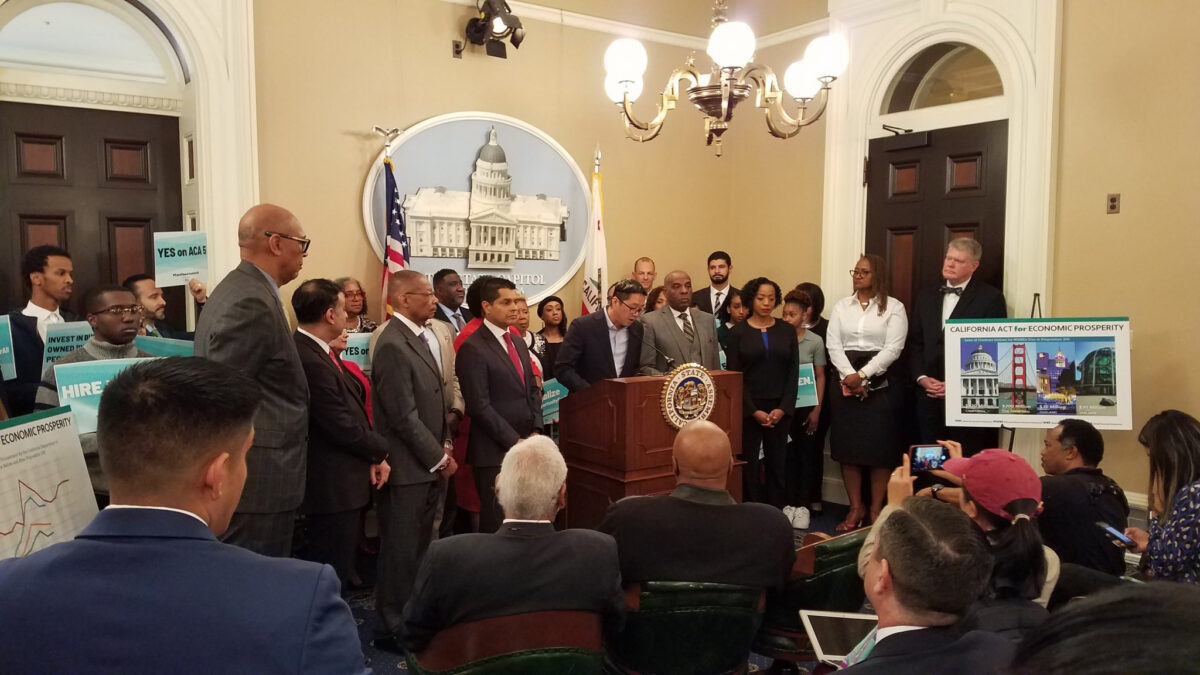Nearly 25 years after ballot measure Proposition 209 ended race- and gender-conscious affirmative action in the state of California, several California legislators are working in partnership with a broad multiracial coalition of advocacy groups and have introduced a new bill — Assembly Constitutional Amendment 5 (ACA5) — to repeal Proposition 209 and to restore equal opportunity for all Californians.
The bill, announced in a press conference at the California State Capitol this morning, cites the damage enacted by two decades under Proposition 209 to women, people of colour and minority-owned businesses, many of whom have become increasingly underrepresented in California state schools and the professional sector.
In the bill’s preamble, legislators note that since the passage of Proposition 209, state enterprise programs targeting women- and minority-owned small businesses have been “decimated”, resulting in an estimated $1 billion dollars in lost contracts as well as a significant reduction in the number of minority-owned businesses in some sectors.
Since the passage of Proposition 209, state enterprise programs targeting women- and minority-owned small businesses have been “decimated”, resulting in an estimated $1 billion dollars in lost contracts as well as a significant reduction in the number of minority-owned businesses in some sectors.
Although rarely noted in reporting around the affirmative action fight in California, Proposition 209 also targeted gender-conscious affirmative action policies. This has allowed gender rights to lag in California: women are still grossly underrepresented in management and leadership positions, and the overall work environment remains hostile for women in Silicon Valley. In academia, women account for only one-third of tenured faculty even though women make up just over one-half of University of California students. In an era of rising misogyny and sexism throughout the United States, California cannot afford to allow gender rights to remain deprioritized.
The effect of Proposition 209 on racial diversity at University of California schools has also been especially pronounced. The bill notes that immediately following Proposition 209’s passage, the enrollment of underrepresented minority students at UC Berkeley and UC Los Angeles fell by 60%, and dropped by 12% across all UC schools. In reporting I did several years ago around this issue, I further found that Proposition 209 has not increase Asian American admissions at UC schools — an outcome that Asian American opponents of affirmative action argue would happen — and that, instead, Proposition 209 has only exacerbated barriers for underrepresented Asian Americans at UC schools.
Several years ago, an earlier effort to repeal Proposition 209 failed following vitriolic backlash from a grassroots movement of conservative Chinese Americans. Those activists have since pursued numerous federal challenges to the constitutionality of affirmative action and have also vociferously opposed data equity efforts that would better illustrate how these policies hurt other Asian Americans. However, this subset of conservative Asian American activists do not represent the broader Asian American community: studies continue to find that roughly 70% of Asian American voters still support race-conscious affirmative action policies.
Studies continue to find that roughly 70% of Asian American voters still support race-conscious affirmative action policies.
The reason for this is simple: affirmative action promotes equal opportunity for women, people of colour, and immigrants. Proposition 209 has been damaging to many communities of colour, including to California’s many Asian American students, women, and business owners. Proposition 209 has diminished higher education access for many in our community, especially for California’s large Southeast Asian American and Pacific Islander populations.
Furthermore, Proposition 209 has made it more difficult for Asian-owned small businesses to win public contracts: Asian American-owned businesses win disproportionately more public contracts in cities like Chicago or Atlanta — where affirmative action is legal — than in San Francisco. It is senseless for Asian Americans to continue to support a ballot measure that has proven so damaging to ourselves and that has so devastated Black and Brown communities in California.
It is senseless for Asian Americans to continue to support a ballot measure that has proven so damaging to ourselves and that has so devastated Black and Brown communities in California.
With all this in mind, the time has come to repeal Proposition 209 and to restore equal opportunity for all Californians. ACA5 is currently in committee, and its authors hope to bring it to a general vote in the next few months. Please contact your elected officials now to let them know you support this effort, and stay tuned to this blog as we follow this developing story. You can also follow advocacy groups through the hashtag #OpportunityForAll.

